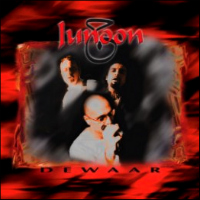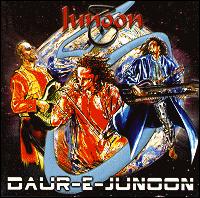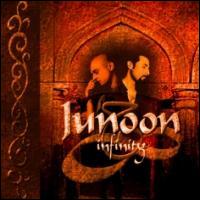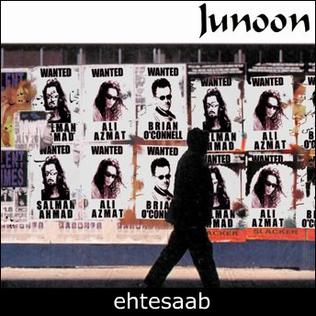
Junoon is a sufi rock band from Lahore, Punjab, Pakistan, and Tappan, New York, formed in 1990. The band is directed by founder, lead guitarist and songwriter, Salman Ahmad, who was soon joined by keyboardist Nusrat Hussain, bass guitarist Brian O’Connell and vocalist Ali Azmat. Junoon is Pakistan's and one of South Asia's most successful bands; the Q magazine regarded them as "One of the biggest bands in the world" and The New York Times called Junoon "the U2 of Pakistan". Since their inception, the group has released a collective total of nineteen albums: seven studio albums; one soundtrack; two live albums; four video albums; and five compilations. They have sold over 30 million copies worldwide.

Salman Ahmad is a Pakistani American musician, rock guitarist, physician, activist, and professor at the City University of New York.

Junoon is the debut album of the Pakistani sufi rock band Junoon, released on 30 September 1991. It was released by EMI and recorded at the EMI studios in Karachi in 1990. The album is produced by founder, songwriter and lead guitarist Salman Ahmad. The album contained a total track list of twelve songs with eight tracks being in Urdu language, three tracks in English and one instrumental.

Inquilaab is the third studio album and the fourth overall album of the Pakistani band Junoon. Although previous albums by Junoon also achieved considerable success, 'Inquilaab' contained the band's first major hit, the patriotic song "Jazba-e-Junoon". The album also contained the hit "Saeein," which marked Junoon's foray into what later became the sufi rock sound that Junoon is most popularly associated with. Other hits from the album were "Mera Mahi" and "Husan Walo".

Azadi is the fourth studio album and the fifth overall album of the Pakistani sufi rock band, Junoon. The album was released in 1997 and established the Sufi rock sound that the band pioneered on their previous album, Inquilaab. The album was popular worldwide, bringing fame to Junoon.

Parvaaz is the fifth studio album and sixth overall album by the Pakistani band Junoon. It was released in 1999 and features songs mostly based on the poetry of the great Punjabi Sufi poet Bulleh Shah.

Ishq is the sixth studio album and the ninth overall album of the Pakistani sufi rock band, Junoon. The album was released on January 1, 2001 and was released by the title of Andaz outside Pakistan.

Dewaar is the seventh studio album and the thirteenth overall album of the Pakistani band, Junoon released in 2003. This was the last studio album released by the band after which both vocalist, Ali Azmat and bassist, Brian O'Connell, left the band.

Junoon is a Pakistani sufi rock band founded in 1990 by lead guitarist and only original member, Salman Ahmad. The band has released seven studio albums, as well as numerous live albums, compilations, singles, video albums, music videos, and soundtracks. Keyboardist Nusrat Hussain left the band after the first studio album release and was replaced by bassist Brian O'Connell. They released their self-titled debut album in 1991; which barely made a dent in the Pakistani music industry. Guitarist Mekaal Hasan and band producer John Alec replaced O'Connell, and have been playing bass for live shows since O'Connell's departure.
"Jazba-e-Junoon" is a song by the Pakistani sufi rock band Junoon. It is the thirteenth and final track from the band's album third album, Inquilaab (1996), released on EMI Records. Written by lead vocalist and guitarist Salman Ahmad and it is the lead single on the album, the song uses blending of rock guitars and bluesy vocals with eastern elements like the use of tablas, raga-inspired melodies and traditional Pakistani folk music.

Daur-e-Junoon is the second live album and overall the twelfth album released by the Pakistan rock band, Junoon. The album was released on March 29, 2002.

Infiniti is the debut album of the singer-songwriter/multi-instrumentalist Salman Ahmad. The album was released on July 1, 2005 under the record label EMI. Singles from the album include "Ghoom Taana" and "Al-Vida". The single "Ghoom Taana" also featured in Junoon's seventh studio album Dewaar. Although, the album was released as a solo album of Salman Ahmad but it was slated to be Junoon's eighth studio album.

Rock & Roll Jihad: A Muslim Rock Star's Revolution is a book written by Salman Ahmad, published on January 12, 2010 by Simon & Schuster. It is a biography of the author regarding his time with his rock band Junoon and all the struggle he faced to become a rockstar in Pakistan.

"Ehtesaab" is the second track on the 1995 compilation album Kashmakash by the sufi rock band Junoon, and is the second single from the album. After the release of the band's first real big hit single "Jazba-e-Junoon", which was the song of the 1996 Cricket World Cup. "Ehtesaab" was their second hit and was released in December 1996. The video of the single was directed by Pakistani director, Shoaib Mansoor.
"Yaar Bina" is a song by the Pakistani sufi rock band Junoon, released in April, 1997. It is the fourth track from the band's album fourth album, Azadi (1997), released on EMI Records. Written by lead guitarist and founder of the band Salman Ahmad and writer Sabir Zafar, it is one of the lead single's on the album, the other being "Sayonee", the song uses blending of rock guitars and bluesy vocals with eastern elements like the use of tablas, raga-inspired melodies and traditional Pakistani folk music.
"Bulleya" is a song by the Pakistani sufi rock band Junoon, released in 1999. It is the first track from the band's fifth album, Parvaaz (1999), recorded at Abbey Road Studios, London and released on EMI Records. The song is a famous kafi written by the sufi saint Bulleh Shah. Bulleh Shah is famous for his spiritual and metaphysical poetry, and Bullah Ki Jaana is one of his well-known poems. The song is composed and produced by lead guitarist and founder of the band Salman Ahmad. It is the lead single on the album, the song uses blending of rock guitars and bluesy vocals with eastern elements like the use of tablas, raga-inspired melodies and traditional Pakistani folk music.

Junoon 20 is the fourth compilation album and the nineteenth overall album of the Pakistani band Junoon. The compilation album served as a tribute album for the 20th anniversary of the band and is divided into two volumes. The first edition of the album featured many well known musicians like Bilal Khan, Outlandish, Aag, Usman Riaz and Laal’s Taimur Rahman, paying tribute to Junoon by covering some of the band's famous songs. The first volume of the album was released on September 30, 2011, and was made digitally available on October 5, 2011.

Talaash is the second studio album of the Pakistani sufi rock band Junoon, released on September 3, 1993. The album was to be their first with bassist Brian O'Connell, who joined the band after Nusrat Hussain departed from the band to pursue his career as a solo artist and released his debut album Amrit in 1992. This was also the first Junoon album produced by Salman Ahmad and O'Connell, both also went on releasing several other albums by Junoon before O'Connell left the band after Dewaar in 2003. The album also served as a soundtrack for the Pakistani television show Talaash, which featured the band and its novel storyline was based on the band.















